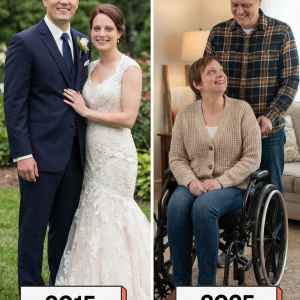Semy, Our Four-Legged Guardian
Evenings in our home were always peaceful. We lived in a quiet neighborhood where kids rode bikes until dusk and neighbors waved from their porches. Life felt safe—predictable, even.
Our routine was the same every night: a warm dinner, a bit of TV, and then each of us heading to bed. My wife and I shared the master bedroom, while our six-year-old son, Emiliano, and baby daughter, Camila, slept in their own rooms.
But one night, that sense of security was shattered.
It was the kind of early morning where everything is hushed—no traffic, no wind, just the faint hum of nature outside. My wife was fast asleep beside me, and though I was exhausted, I couldn’t drift off.
Downstairs, Semy, our loyal chocolate Labrador, was curled up in his bed near the staircase. For eight years, he’d been more than just a pet—he was family. He had a calm, intuitive nature, always gentle with the kids, always alert. The kind of dog who makes you feel safe just by being there.
But that night, something had him on edge.
Around 3 a.m., I felt a jolt—movement on the bed. I stirred, thinking maybe my wife had shifted in her sleep. But then I heard soft panting, followed by the thud of heavy paws on the mattress.
It was Semy.
He had never, not once, jumped into bed with us. He respected boundaries we’d taught him since he was a pup. That’s why seeing him standing on my wife’s chest, barking low and insistent, sent chills down my spine.
He wasn’t playful. He wasn’t scared. He was focused—his eyes locked on her, his nose nudging her gently. Something was wrong.
“What is it, Semy?” I whispered, placing a hand on his head.
But he didn’t look at me. He stayed glued to her face, sniffing, nudging, whining softly.
Just as my wife began to stir, confused, a new sound pierced the silence.
A creak in the hallway.
It was subtle, almost unnoticeable—but I heard it. A light step on the wooden floor. Then another. Then a murmur.
My heart stopped. I looked at Semy—he was now standing between us and the door, growling, every muscle on alert. That’s when I knew: the danger wasn’t in the room. It was just outside.
I signaled to my wife to stay silent, finger to lips. She saw my face, looked at Semy, and instantly understood.
We listened. More soft noises. Shuffling. Something falling over.
Could it be a burglar? Someone dangerous?
My thoughts raced to our children, asleep and vulnerable. I couldn’t freeze. Not now.
I grabbed my phone and dialed 911 with shaking fingers. Then I nodded to my wife to gather the kids. Semy didn’t budge—he remained rooted at the door, his growl now deep and threatening.
My wife returned with Emiliano and Camila in her arms. The children, groggy and confused, sensed something was wrong but said nothing.
We hurried into the bathroom—the only room with a lock—and sat on the cold tile floor, holding the kids close. Semy stayed outside, guarding our door like a sentry.
From inside, we could hear the intruders. Footsteps. Low whispers. The sound of drawers opening, objects being moved.
Camila whimpered, and Emiliano clutched his teddy bear. I held their tiny bodies close and whispered, “We’re together. Semy’s here. We’re safe.”
Minutes dragged like hours.
Then, suddenly, a voice outside: “Police! Nobody move!”
Relief swept through me like a wave. We opened the door slowly and stepped out to find two officers pinning two hooded men to the ground. They’d come in through the living room window, pried open with a crowbar.
They already had a stash of stolen items: our laptop, the kids’ game console, my wife’s purse.
One officer, hearing our story, looked down at Semy—still alert, still standing firm.
“You’ve got a hero here,” he said, giving him a gentle pat.
We didn’t sleep the rest of that night. Too shaken, too grateful.
Who knows what might’ve happened if Semy hadn’t reacted? Maybe they would’ve made it to the bedrooms. Maybe worse. But because of him, we had time. Time to act. Time to protect each other.
The next morning, Emiliano hugged Semy tight and told him, “I’ll never be mad at you again for stealing cookies.” Camila wrapped him in her baby blanket, her way of saying thank you.
My wife and I made a new rule: from now on, Semy could sleep wherever he wanted. Bed, hallway, bedroom—it was his choice. He had more than earned it.
We got him a giant bone and a plush new blanket. As I laid it down that night, I whispered, “Thank you, buddy. You saved us.”
Semy looked at me, tail wagging, eyes full of that quiet understanding dogs always seem to have.
Word of what happened spread fast. Neighbors dropped by, asking about the story. Many were shocked—and many began thinking of adopting dogs themselves.
The local police even returned a few days later to recognize Semy with a small medal and a plaque bearing his name. It now hangs proudly in our living room.
“My dog’s a hero,” Emiliano tells his classmates. “He saved us.”
And he’s right.
Life eventually returned to normal. The kids went back to school, we returned to work, and Semy resumed his morning walks.
But something in us changed. We began to notice every tail wag, every bark, every quiet nuzzle a little more. We appreciated, truly appreciated, the quiet hero who slept near our door.
Because heroes don’t always wear badges or capes.
Sometimes, they wear fur.
And sometimes, they save your life with a bark.





